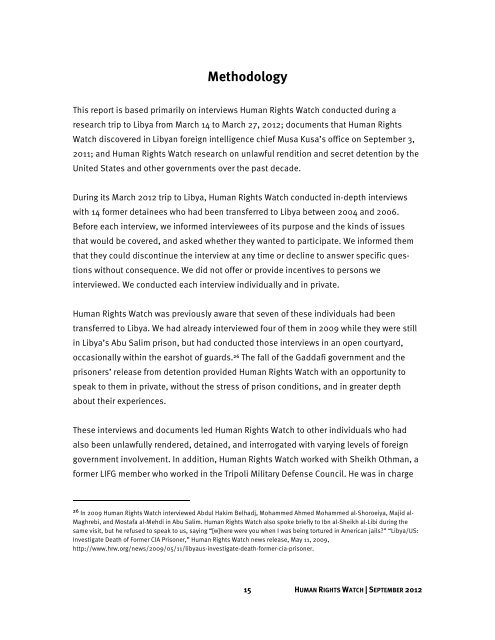Delivered Into Enemy Hands - Human Rights Watch
Delivered Into Enemy Hands - Human Rights Watch
Delivered Into Enemy Hands - Human Rights Watch
Create successful ePaper yourself
Turn your PDF publications into a flip-book with our unique Google optimized e-Paper software.
Methodology<br />
This report is based primarily on interviews <strong>Human</strong> <strong>Rights</strong> <strong>Watch</strong> conducted during a<br />
research trip to Libya from March 14 to March 27, 2012; documents that <strong>Human</strong> <strong>Rights</strong><br />
<strong>Watch</strong> discovered in Libyan foreign intelligence chief Musa Kusa’s office on September 3,<br />
2011; and <strong>Human</strong> <strong>Rights</strong> <strong>Watch</strong> research on unlawful rendition and secret detention by the<br />
United States and other governments over the past decade.<br />
During its March 2012 trip to Libya, <strong>Human</strong> <strong>Rights</strong> <strong>Watch</strong> conducted in-depth interviews<br />
with 14 former detainees who had been transferred to Libya between 2004 and 2006.<br />
Before each interview, we informed interviewees of its purpose and the kinds of issues<br />
that would be covered, and asked whether they wanted to participate. We informed them<br />
that they could discontinue the interview at any time or decline to answer specific questions<br />
without consequence. We did not offer or provide incentives to persons we<br />
interviewed. We conducted each interview individually and in private.<br />
<strong>Human</strong> <strong>Rights</strong> <strong>Watch</strong> was previously aware that seven of these individuals had been<br />
transferred to Libya. We had already interviewed four of them in 2009 while they were still<br />
in Libya’s Abu Salim prison, but had conducted those interviews in an open courtyard,<br />
occasionally within the earshot of guards. 26 The fall of the Gaddafi government and the<br />
prisoners’ release from detention provided <strong>Human</strong> <strong>Rights</strong> <strong>Watch</strong> with an opportunity to<br />
speak to them in private, without the stress of prison conditions, and in greater depth<br />
about their experiences.<br />
These interviews and documents led <strong>Human</strong> <strong>Rights</strong> <strong>Watch</strong> to other individuals who had<br />
also been unlawfully rendered, detained, and interrogated with varying levels of foreign<br />
government involvement. In addition, <strong>Human</strong> <strong>Rights</strong> <strong>Watch</strong> worked with Sheikh Othman, a<br />
former LIFG member who worked in the Tripoli Military Defense Council. He was in charge<br />
26 In 2009 <strong>Human</strong> <strong>Rights</strong> <strong>Watch</strong> interviewed Abdul Hakim Belhadj, Mohammed Ahmed Mohammed al-Shoroeiya, Majid al-<br />
Maghrebi, and Mostafa al-Mehdi in Abu Salim. <strong>Human</strong> <strong>Rights</strong> <strong>Watch</strong> also spoke briefly to Ibn al-Sheikh al-Libi during the<br />
same visit, but he refused to speak to us, saying “[w]here were you when I was being tortured in American jails?” “Libya/US:<br />
Investigate Death of Former CIA Prisoner,” <strong>Human</strong> <strong>Rights</strong> <strong>Watch</strong> news release, May 11, 2009,<br />
http://www.hrw.org/news/2009/05/11/libyaus-investigate-death-former-cia-prisoner.<br />
15 HUMAN RIGHTS WATCH | SEPTEMBER 2012
















